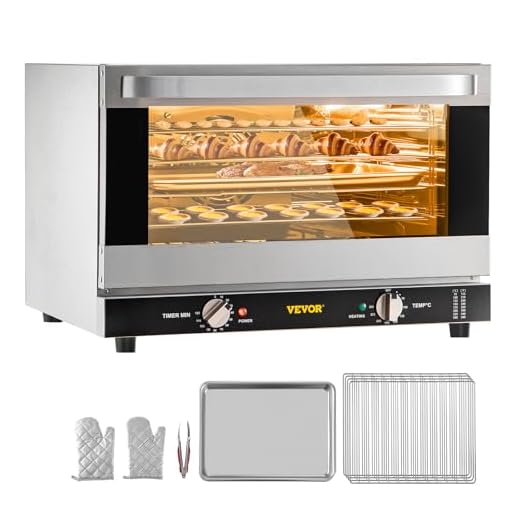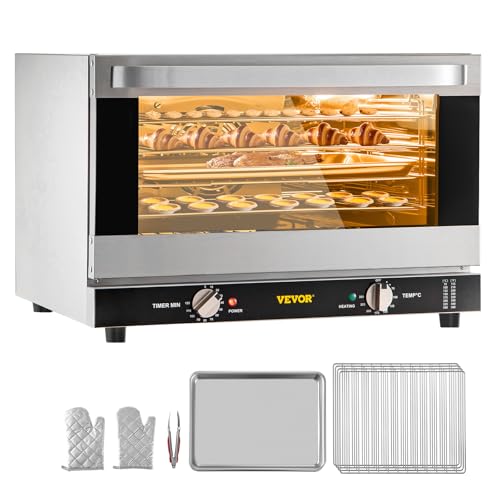

Commercial convection ovens are a popular choice for many businesses in the food industry. These ovens are known for their ability to circulate hot air efficiently, resulting in faster and more even cooking. However, one common question that arises when considering the installation of a commercial convection oven is whether or not it requires venting.
In general, commercial convection ovens do not require venting. Unlike traditional ovens, which rely on radiant heat to cook food, convection ovens use a fan to circulate hot air. This means that the heat is evenly distributed throughout the oven, resulting in faster cooking times and reduced energy consumption. Because convection ovens do not produce smoke or produce a significant amount of heat that needs to be vented, they can often be installed without the need for a ventilation system.
However, there are a few factors to consider when determining whether or not a commercial convection oven needs venting. First, it is important to check local building and health codes to ensure compliance. Some jurisdictions may have specific requirements for venting commercial cooking equipment, including convection ovens.
Additionally, the type of food being cooked and the volume of cooking should also be considered. Some foods, such as fatty meats or foods with a high moisture content, can produce more smoke or steam during the cooking process. In these cases, it may be beneficial to install a ventilation system to remove any excess smoke or moisture from the kitchen.
In conclusion, while commercial convection ovens generally do not require venting, it is important to check local regulations and consider the type of food being cooked. By ensuring compliance with building codes and addressing any specific ventilation needs, businesses can enjoy the benefits of a commercial convection oven without compromising safety or comfort in the kitchen.
Understanding Commercial Convection Ovens
Commercial convection ovens are essential equipment in any professional kitchen, offering a fast and efficient way to cook a variety of dishes. These ovens use a convection heating method that circulates hot air evenly throughout the cooking chamber, resulting in faster cooking times and more consistent results.
One of the key features of commercial convection ovens is the fan located in the back. This fan helps to distribute the hot air evenly, ensuring that every part of the food is cooked at the same temperature. It also helps to eliminate hot spots and reduces the cooking time by up to 25% compared to traditional ovens.
Benefits of Commercial Convection Ovens
There are several benefits to using a commercial convection oven:
- Faster Cooking Times: The circulating hot air allows food to cook more quickly, which is ideal for busy kitchens that need to prepare large quantities of food in a short amount of time.
- Energy Efficiency: Because the cooking time is reduced, commercial convection ovens can be more energy efficient compared to traditional ovens. This can lead to cost savings in the long run.
- Consistent Cooking: The even heat distribution ensures that food is cooked consistently, reducing the risk of unevenly cooked or burnt dishes.
- Versatility: Commercial convection ovens are suitable for a wide range of cooking tasks, including baking, roasting, and even dehydration.
Proper Usage and Maintenance
To get the most out of your commercial convection oven, it’s important to use and maintain it correctly. Here are a few tips:
- Preheating: Most commercial convection ovens require preheating before use. This allows the oven to reach the optimal cooking temperature and ensures that the food cooks evenly.
- Rack Position: Proper rack positioning is essential for even cooking. Make sure to follow the manufacturer’s recommendations and adjust the racks as needed.
- Cleaning: Regular cleaning is necessary to maintain optimal performance. Make sure to clean the racks, trays, and interior of the oven regularly to remove any food residue or grease buildup.
- Calibration: Periodically calibrating the oven is important to ensure accurate temperature settings. This can help prevent undercooked or overcooked food.
Overall, commercial convection ovens are a valuable asset in any professional kitchen. Understanding how they work and following proper usage and maintenance guidelines will help you maximize their efficiency and get the best results from your cooking efforts.
The Importance of Ventilation
Ventilation is a crucial aspect of using commercial convection ovens. These powerful appliances generate a significant amount of heat, steam, and smoke during operation, and proper ventilation is necessary to remove these byproducts from the kitchen.
First and foremost, ventilation helps maintain a comfortable working environment for chefs and kitchen staff. Without proper ventilation, the excessive heat and steam generated by the oven can make the kitchen unbearably hot, leading to discomfort and potentially affecting work productivity.
Furthermore, ventilation plays an important role in maintaining air quality within the kitchen. The release of smoke and odors from cooking can quickly accumulate, leading to poor air quality and an unpleasant working environment. Ventilation systems help remove these pollutants, ensuring that the air remains fresh and clean for both staff and customers.
In addition, proper ventilation is necessary for the longevity of the oven itself. Excessive heat buildup can damage the oven and its components, leading to costly repairs or even the need for a replacement. Ventilation helps dissipate heat and prevent overheating, extending the lifespan of the oven and ensuring its optimal performance.
The Benefits of Proper Ventilation:
- Improved working conditions for kitchen staff
- Enhanced air quality
- Prevention of heat damage to the oven
- Extended lifespan of the oven
- Reduced risk of fire hazards
In conclusion, proper ventilation is crucial when using commercial convection ovens. It not only creates a comfortable working environment, but also helps maintain air quality, prevents oven damage, and ensures the overall safety of the kitchen. Investing in a well-designed ventilation system is essential for any commercial kitchen utilizing convection ovens.
Health and Safety Regulations
In order to ensure the health and safety standards in commercial kitchens, there are specific regulations that pertain to the use of commercial convection ovens. These regulations are designed to protect both the employees working in the kitchen as well as the customers who consume the food prepared in these ovens.
Safety Standards
Commercial convection ovens must adhere to strict safety standards to minimize the risk of accidents and injuries. These standards include:
- Proper insulation to prevent burns and reduce the risk of fire hazards
- Clear and visible labeling of hot surfaces to prevent accidental burns
- Secure closing mechanisms for oven doors to prevent injury from hot bursts of steam
- Emergency shut-off switches to quickly stop the oven in case of emergencies
Health Regulations
In addition to safety regulations, there are also health regulations that need to be followed when using commercial convection ovens:
| Regulation | Description |
|---|---|
| Proper Ventilation | Commercial convection ovens should be installed with proper ventilation systems in order to remove any smoke, fumes, or odors that may be emitted during the cooking process. This helps to maintain a clean and healthy kitchen environment. |
| Regular Cleaning | It is important to regularly clean and maintain commercial convection ovens to prevent the buildup of grease, food particles, and bacteria. This not only ensures the quality of the food being cooked but also minimizes health risks. |
| Temperature Control | Commercial convection ovens should have accurate temperature controls to ensure that food is cooked to the appropriate internal temperatures, eliminating the risk of foodborne illnesses. |
By adhering to these health and safety regulations, commercial kitchens can ensure the well-being of their staff and customers, as well as maintain compliance with local health and safety authorities.
Benefits of Proper Ventilation
Proper ventilation is essential for commercial convection ovens as it offers several benefits:
1. Improved Air Quality
Venting allows for the removal of smoke, steam, and other airborne contaminants released during the cooking process. This helps in maintaining a clean and healthier working environment. It also reduces the risk of employees being exposed to harmful fumes and odors.
2. Increased Energy Efficiency
By venting out excess heat and moisture, proper ventilation helps in maintaining the optimal temperature inside the oven. This results in energy savings as the oven doesn’t need to work harder to maintain the desired temperature.
3. Extended Lifespan of the Oven
Proper ventilation prevents the buildup of excess heat and moisture, which can lead to the premature breakdown of oven components. By promoting airflow, ventilation helps in prolonging the lifespan of the oven, reducing the need for frequent repairs and replacements.
4. Enhanced Cooking Performance
Effective ventilation ensures uniform heat distribution inside the oven, leading to consistent cooking results. It helps in preventing hot spots and cold spots, ensuring that food is cooked evenly and thoroughly.
Overall, proper ventilation in commercial convection ovens is crucial for creating a safe, efficient, and productive cooking environment. It promotes better air quality, improves energy efficiency, increases the lifespan of the oven, and enhances cooking performance.
| Benefits of Proper Ventilation |
|---|
| Improved Air Quality |
| Increased Energy Efficiency |
| Extended Lifespan of the Oven |
| Enhanced Cooking Performance |
Q&A
Do commercial convection ovens require a vent hood?
Yes, commercial convection ovens typically require a vent hood. These ovens produce a lot of heat and moisture, so it’s important to have proper ventilation to prevent overheating and maintain a comfortable working environment.
What are the benefits of venting a commercial convection oven?
Venting a commercial convection oven offers several benefits. Firstly, it helps remove excess heat and moisture from the kitchen, which can improve the comfort of the working environment. Secondly, proper ventilation prevents the buildup of condensation and reduces the risk of mold and bacteria growth. Lastly, it helps maintain the efficiency and performance of the oven by preventing overheating and prolonging its lifespan.







